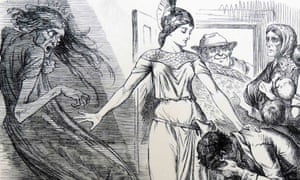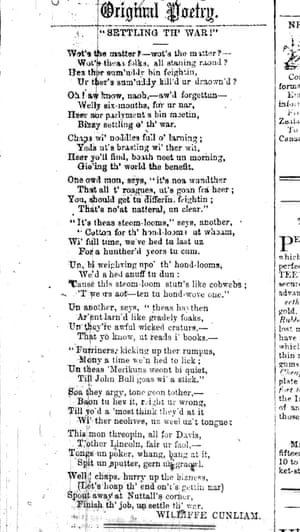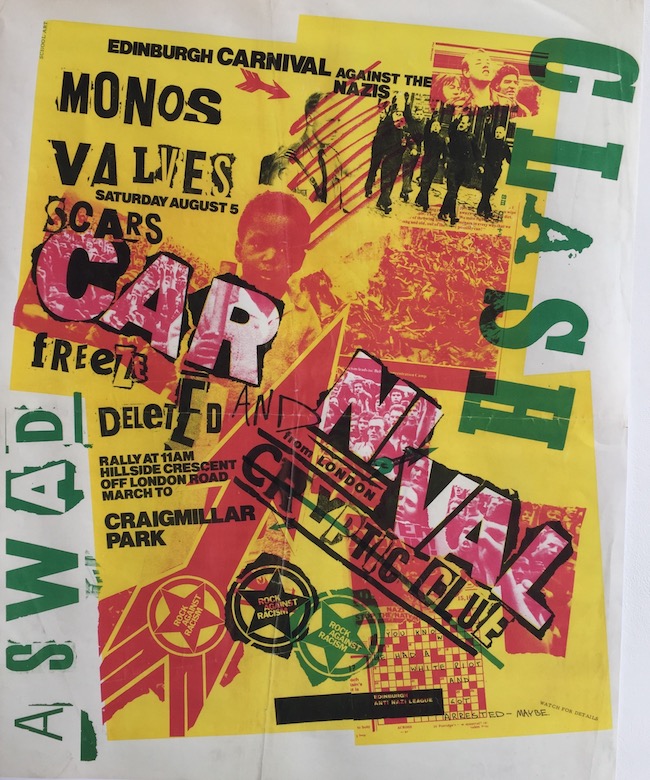Friday, August 31, 2018
Saturday, August 18, 2018
Thursday, August 16, 2018
Pete Seeger talks about Woody Guthrie (2006)
Pete Seeger, in a conversation with Tim Robbins for Pacifica Radio, talks about "This Land Is Your Land" and traveling with Woody Guthrie (2006)
Friday, August 10, 2018
Forgotten voices of Lancashire’s poverty-stricken cotton workers

The forgotten voices of Lancashire’s poverty-stricken cotton workers during the US civil war have been heard for the first time in 150 years, after researchers at the University of Exeter unearthed a treasure trove of poetry.
Up to 400,000 of the county’s cotton workers were left unemployed when the war stopped cotton from reaching England’s north-west in the 1860s and the mills were closed. Without work, they struggled to put food on the table, and experts from the University of Exeter have discovered that many of them turned to poetry to describe the impact of the cotton famine.
Written between 1861 and 1865, many of the poems are by the workers most affected by the famine. Around a quarter of the 300 poems discovered so far are written in the Lancashire dialect, with some published in local newspapers or simply sent in letters. All the poems were held in local archives and had never been studied or collected.
Simon Rennie, who is leading the project, said: “A lot of these poems are anonymous, or signed with initials; some of the writers describe themselves as ‘a boatbuilder’, ‘a millworker’, or ‘an operative’ … What we’ve found here is a significantly different view of a period of history that is already well documented – it’s that sense of history from below.
“It shows how strong working-class poetic culture was at the time – if you’re working for 12 hours, you might still have time to write a poem in the evening,” he added.

The poems describe the grinding misery of poverty. In A Song of the Cotton Famine, the anonymous author asks: “Shall I again permitted be / To send my kids to schoo’, / Where they con larn to read and write, / Do sums by figures too?” In A Mother’s Wail, by John Plummer in the voice of a woman mourning her dead daughter, he writes of how: “She was starved to death, I say, / Because of the fierce and cruel strife / ’Mid our kinsmen far away.”
Rennie pointed to one poet in particular: the wool sorter Williffe Cunliam, who wrote six of the poems uncovered to date. “I think he was a very good poet – a great poet,” said Rennie. “We don’t have enough of his work to say he was a literary star, but he was fantastic; we’ve found very high-quality work.” Cunliam – whose real name was William Cunliffe - writes in both dialect and standard English, appealing for help for the poor in one poem – “Ye rich and high, / With lands and mansions fine, / Think of the poor in their cold, bare homes, / Can you let them starve and pine?” – while in others, his tone remains dry and ironic.
Only a few of the poems were written by women. “They tend to be middle-class women writing to garner support for charitable causes,” said Rennie. “There is quite a bit of representation of working-class women [in the poems], but we have yet to find a poem that is verifiably by one of them.”
The researchers expect to find hundreds more poems, as the newspapers of the day would generally have a daily poetry column. Rennie said the sheer range shows “there was a vibrant literary culture among Lancashire cotton workers”.
“These poems have an extraordinary range and emotional intensity. Some are in heavy dialect, some are comic, some have high literary ambition and others are satirical. We see repetition of the same types of characters, phrases and poetic rhythms,” he said. “They reveal a previously unheard commentary on one of the most devastating economic disasters to occur in Victorian Britain.”
Rennie and his team have created a publicly accessible database of the poems, along with 100 recordings of them being read. “We are trying simply to show they can be heard as well as read,” said Rennie’s colleague Ruth Mather. “The Lancashire dialect pieces in particular are fiendishly difficult to recite, and we are aware that pronunciation of many terms may be contentious. But we hope we are bringing alive an important part of Lancashire cultural history that has lain relatively dormant for more than 150 years.”
Thursday, August 09, 2018
Wednesday, August 08, 2018
Eric Hobsbawm – Epitaph for a Villain: Roy Cohn – 1989
CHAPTER 18
This footnote to the culture of the Cold War USA was published on 28 October 1989. It was written, in New York, for the series Heroes and Villains' published in The Independent Magazine in the early and hopeful years of that paper.
Few villains start their career as international jokes, but this happened to my choice, in his days as a young witch-hunter.
Well, it was not quite the start. Roy Cohn (1927-86) had already dodged military service, tried to bribe his professor Lionel Trilling, hounded the eminent expert on central Asia, Owen Lattimore, and helped to sentence the Rosenbergs to death as Russian spies, before he and his partner David Schine, two young men in their twenties who sounded like a bad vaudeville act, visited Europe in 1953 to investigate the Communist World Conspiracy for Senator McCarthy.
The parts of the Conspiracy that interested them were the failure of US Information Service libraries abroad to eliminate the works of Dashiell Hammett, and also the insufficient anti-communism of the BBC.
Cohn and Schine provided a wonderful excuse for demonstrating European anti-McCarthyism, not to mention cultural pastern, since his New York Jewish Roosevelt-liberal milieu abhorred intolerance and witch-hunts.
As a lawyer I don't care what the law is, tell me who the judge is he visibly preferred shady clients and mobsters, and not only found it useful but enjoyed suggesting that he could get people killed.
More to the point, because it eventually sank him, he floured not only routine obligations but the unspoken obligations of professionalism.
He bilked not only tradesmen, but the ghostwriter of his books — anyone who could, he thought, do him no harm. He betrayed his clients without hesitation. In the decades when it was child's play for a bright and connected lawyer to make millions legally in the Big Apple, he was a crook because he liked to be.
He had neither convictions nor even ambitions.
The great experiences of his life-time passed him by: the War, civil rights, Vietnam, Israel and the cause of minorities.
He was tempted neither by office nor by the pure thrill of capital accumulation which moved so many of the men with whom he consorted, one-dimensional Fausts to whom he played Mephisto the facilitator.
He owned nothing, collected nothing, looked after nothing.
What did he really want, except getting his own way in all things, avoiding uncomfortable thoughts and enjoying power behind the scenes, the ability to do favours and to carry out threats, recognized by those who counted and in the media by which he always lived?
It is too late to know.
Apart from a few unrequited personal favours to friends and lovers, and an ability to entertain, he did good to none and brought ruin to many—not only to McCarthy's victims but, by his irresponsibility, to the senator himself. He died as he had lived, jumping the queue over other Aids victims.
The best that can be said of him is that, born in any other country, he would not have become what he did. In no other country would he have received a presidential telegram in hospital ('Nancy and I are keeping you in our thoughts and prayers'). But when he died, even Reagan's White House kept shtum.
––––––––––––––––––––––––––––––––––––––––––––––––––––––––––––––––––
Addendum – Roy Cohn represents Donald Trump and Rupert Murdoch
In 1971, businessman Donald Trump moved to Manhattan, where he became involved in large construction projects.
In 1973 the Justice Department accused him of violating the Fair Housing Act in his operation of 39 buildings.
The government alleged that Trump's corporation quoted different rental terms and conditions and made false "no vacancy" statements to African Americans for apartments they managed in Brooklyn, Queens, and Staten Island.
Representing Trump, Cohn unsucessfully filed a countersuit against the government for $100 million, asserting that the charges were irresponsible and baseless.
Cohn also counted Rupert Murdoch among his clients, pressuring President Ronald Reagan repeatedly in furtherance of Murdoch's interests.
Cohn is credited with introducing Trump and Murdoch in the mid-1970s, marking the beginning of what was to be a deep and pivotal association between them.
A timely call from John McDonnell for ‘a new Anti-Nazi League’

British Labour MP John McDonnell's clarion call for a new wave of nationwide opposition to racism and the rising tide of far-right violence is timely.

Mainstream media and Labour’s opponents have embarked on a feeding frenzy with no sign of slackening over anti-semitism claims personalised on leader Jeremy Corbyn.
All complaints must be examined, of course, but it is clear that, for some, no reply by Corbyn will ever suffice.
While he and his party bear the brunt of this campaign, with its twin goals of forcing Labour to accept a definition of anti-semitism that would diminish criticism of Israel and undermine Corbyn to make him susceptible to replacement, the far right is having a field day.
Why did a group of fascist thugs feel confident of their ability to ransack the Bookmarks bookshop round the corner from the Trades Union Congress headquarters and to video and upload their violent escapade?
Why has Boris Johnson returned to the gutter to make offensive comments about Muslim women who wear clothing they regard as appropriate to their religious views?
Former Tory Party national co-chair Sayeeda Warsi suspects that Johnson believes his Islamophobia will be a vote-winner among the Tory faithful when he bids to replace Theresa May in due course.
While current chair Brandon Lewis has asked Johnson to apologise for his insults, the Prime Minister’s silence has been deafening.
Opposition to anti-semitism, Islamophobia and all forms of racism cannot be left to the Westminster village.
The Anti-Nazi League example that McDonnell cites became a mass movement when the organised labour movement threw its weight behind the group, along with cultural, religious and black and ethnic minority forces.
Working openly and honestly with different forces is the best way to isolate and minimise the noxious influence of those who wish to divide us.
Friday, August 03, 2018
Thursday, August 02, 2018
The remains of the oldest public library in Germany, a building erected almost two millennia ago that may have housed up to 20,000 scrolls, have been discovered in the middle of Cologne.
The walls were first uncovered in 2017, during an excavation on the grounds of a Protestant church in the centre of the city. Archaeologists knew they were of Roman origins, with Cologne being one of Germany’s oldest cities, founded by the Romans in 50 AD under the name Colonia. But the discovery of niches in the walls, measuring approximately 80cm by 50cm, was, initially, mystifying.
“It took us some time to match up the parallels – we could see the niches were too small to bear statues inside. But what they are are kind of cupboards for the scrolls,” said Dr Dirk Schmitz from the Roman-Germanic Museum of Cologne. “They are very particular to libraries – you can see the same ones in the library at Ephesus.”
It is not clear how many scrolls the library would have held, but it would have been “quite huge – maybe 20,000”, said Schmitz. The building would have been slightly smaller than the famed library at Ephesus, which was built in 117 AD. He described the discovery as “really incredible – a spectacular find”.
“It dates from the middle of the second century and is at a minimum the earliest library in Germany, and perhaps in the north-west Roman provinces,” he said. “Perhaps there are a lot of Roman towns that have libraries, but they haven’t been excavated. If we had just found the foundations, we wouldn’t have known it was a library. It was because it had walls, with the niches, that we could tell.”
The building would have been used as a public library, Schmitz said. “It is in the middle of Cologne, in the marketplace, or forum: the public space in the city centre. It is built of very strong materials, and such buildings, because they are so huge, were public,” he said.
The walls will be preserved, with the three niches to be viewable by the public in the cellar of the Protestant church community centre, which is currently being built.
Subscribe to:
Posts (Atom)


